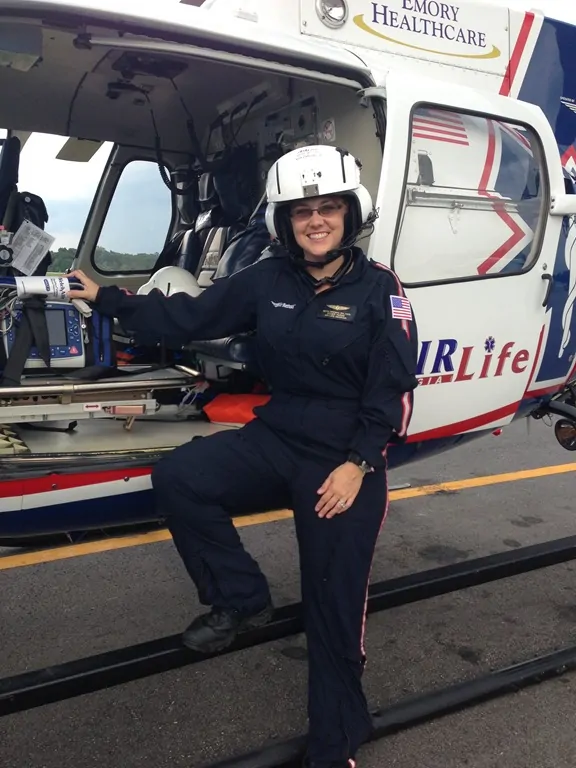Becoming a Nurse Anesthetist (CRNA) is a career goal for many nurses. In fact, when I was in nursing school nearly half of the class stated that becoming a CRNA was their future goal. It’s not surprising since CRNAs are some of the highest paid nurses with earning potential much higher than the typical registered nurse salary. However, many nurses and nursing students are unclear of the process that must be followed to become a CRNA. In this blog post, we’ll discuss some quick facts about CRNAs, average salary, career outlook, educational requirements, and a list of accredited CRNA programs.
Quick Facts About Nurse Anesthetist
| Quick Facts: Nurse Anesthetists, Nurse Midwives, and Nurse Practitioners | |
|---|---|
| 2022 Median Pay | $201,934 per year $80.00 per hour |
| Entry-Level Education | Master’s degree |
| Work Experience in a Related Occupation | None |
| On-the-job Training | None |
| Job Outlook, 2025 | 26% |
Chart via Occupational Outlook Handbook
CRNA Salary
Without a doubt, one of the most attractive aspects of being a nurse anesthetist is the substantial salary. In fact, according to AnesthesiaZone.com:
Certified registered nurse anesthetists are some of the highest-paid advanced practice nursing professionals. Salaries vary greatly by region, type of facility, number of years in practice and sub-specialty. The average Nurse Anesthetist salary for 2006 was more than $160,000. Nurse anesthetists can expect to begin their careers earning in the low $110,000 salary range and can move toward $200,000 or more as they gain additional experience. The rate of pay increases for CRNAs practicing in specific areas.
The Bureau of Labor Statistics states the median salary for CRNAs in 2012 was $96,460 per year or $46.37 per hour. This is compared to an average registered nurse salary of $65,470 per year or $31.48 per hour.
Career Outlook for Nurse Anesthetist
While there are many that feel the recent surge of Nurse Anesthetist’s is diluting the market and, therefore, the salary, the US Bureau of Labor Statistics expects nurse CRNA roles to increase by a massive 45 percent between now and 2030. The job growth for Nurse Anesthetist is estimated to be 31% which is faster than the 19% growth of Registered Nurse jobs. This makes the job outlook for a CRNA great.
Educational Requirements for Nurse Anesthetist
According to the American Association of Nurse Anesthetist, the educational requirements for a CRNA include:
The requirements for becoming a Certified Registered Nurse Anesthetist (CRNA) mainly include having a bachelor’s degree in nursing (or other appropriate baccalaureate degree), Registered Nurse licensure, a minimum of one year acute care experience (for example, ICU or ER), and the successful completion of both an accredited nurse anesthesia educational program and the national certification examination. For more information about the nurse anesthesia profession and its requirements, please read the documents information below.
Interested in Becoming a CRNA?
The steps to becoming a Nurse Anesthetist are many, and it’s important to know exactly what they are to be successful. I’ve looked and have only been able to find one resource that clearly outlines everything you need to know to become a Nurse Anesthetist, and that is the ebook CRNA School Admissions: The Cold Hard Facts. This ebook is written by a CRNA and gives you the information needed to master the CRNA application process.
I want to hear from you. Are you interested in pursuing a career as a Nurse Anesthetist? What schools have you researched? What have you heard about the profession? Are there any questions you have or myths you want to dispel? Sound off in the comments below.
Getting a specialty certification as an advanced practice nurse can be a huge boost to your earning potential. We wrote some tips about the PMHNP exam that may be relevant for CRNA exam as well.






A book literally called “CRNA School Guide” is also pretty good. It has some unique ideas along with the more obvious things (the obvious stuff was still helpful since it provided me more assurance that certain things were not just a waste of time). It also comes with a searchable spreadsheet of all CRNA school with a ton of info about each school for comparison and a book with some tips for financing school.
You would never see a CRNA, or any OR staff member with an OR hat propped on their head with long hair hanging down.
I am a nursing student in Colorado. I am highly interested in becoming a CRNA! The money is a nice perk, but my real goal is being in an OR! I love the environment, and through observing several surgeries (with stars in my eyes, maybe some drool (: ) this career is amazing! Although the majority of your patients are sleeping, I love the aspect of being the one to step in in an emergency and help out! Maybe these are just the experiences that I have had, but the CRNA’s I have observed are rockstars! I’ve heard the biggest downfall of being a CRNA is the lack of bedside interaction.
I have been looking at CRNA schools in Louisiana (Our Lady of the Lake), LSUHSC in New Orleans, and the University of Akron (I believe it’s UofA?)
I have a few questions, have you seen the trend for CRNA’s lean towards PhD? I have been researching and have found that it is becoming a requirement to have a Master’s Degree in Nursing before you can pursue this career. I finish my BSN in September, and if I have to pursue my MSN before I can apply i’ll be heartbroken. Of course this was the intention as well, but an entire extra degree is not what I want to do. However, pursing your dreams is never easy!
Thanks!
Shelby
Shelby,
Thank you so much for your comment. I wish you luck on your journey to becoming a CRNA.
As far as the requirement of having an MSN before entering CRNA school, I am not sure. I will say that I’ve never heard that before. However, I can tell you that admission into CRNA school is extremely competitive, so I would think that perhaps those that do have the MSN have an edge over those that do not. However American Association of Nurse Anesthetists states the requirements for becoming a CRNA include: a BSN and 1 year of critical experience. http://www.aana.com/ceandeducation/becomeacrna/pages/default.aspx
Each CRNA school is going to be slightly different in their requirements beyond that. From what I’ve been able to find, Our Lady of the Lake has both a DNP-NA and an MSN-NA program.
I hope this is helpful!